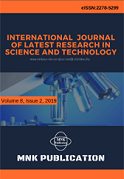DOI:10.29111/ijlrst ISRA Impact Factor:3.35
Research Paper Open Access
International Journal of Latest Research in Science and Technology Vol.6 Issue 5, pp 4-16,Year 2017
Correspondence should be addressed to :
Received : 11 September 2017; Accepted : 20 October 2017 ; Published : 31 October 2017

| Download | 125 |
|---|---|
| View | 180 |
| Article No. | 10752 |
The evaluation of the professional development program is based on data collected from 36 participants on the effectiveness of training. Evaluation was also conducted on professional development in the use of software and hardware that can be used to support and improve teaching and learning in mathematics. One participant in the professional development program was selected to provide a case study of an individual lecturer provided with additional support and mentoring in the use of the Tablet in lectures and the production video resources for use with students. Lectures from Oman and Malaysia had positive perspectives as to their future use of the Tablet PC, their own production of resources and how to use learning design in the eLearning.
Copyright © 2017 Bothaina Bukhatwa et al. This is an open access article distributed under the Creative Commons Attribution 4.0 International (CC BY 4.0) license which permits unrestricted use, distribution, and reproduction in any medium, provided the original work is properly cited.
Bothaina Bukhatwa , " Case Study: Evaluation Of The Raising Awareness Professional Development Program ", International Journal of Latest Research in Science and Technology . Vol. 6, Issue 5, pp 4-16 , 2017

MNK Publication was founded in 2012 to upholder revolutionary ideas that would advance the research and practice of business and management. Today, we comply with to advance fresh thinking in latest scientific fields where we think we can make a real difference and growth now also including medical and social care, education,management and engineering.

We offers several opportunities for partnership and tie-up with individual, corporate and organizational level. We are working on the open access platform. Editors, authors, readers, librarians and conference organizer can work together. We are giving open opportunities to all. Our team is always willing to work and collaborate to promote open access publication.

Our Journals provide one of the strongest International open access platform for research communities. Our conference proceeding services provide conference organizers a privileged platform for publishing extended conference papers as journal publications. It is deliberated to disseminate scientific research and to establish long term International collaborations and partnerships with academic communities and conference organizers.